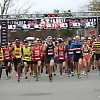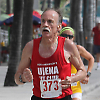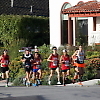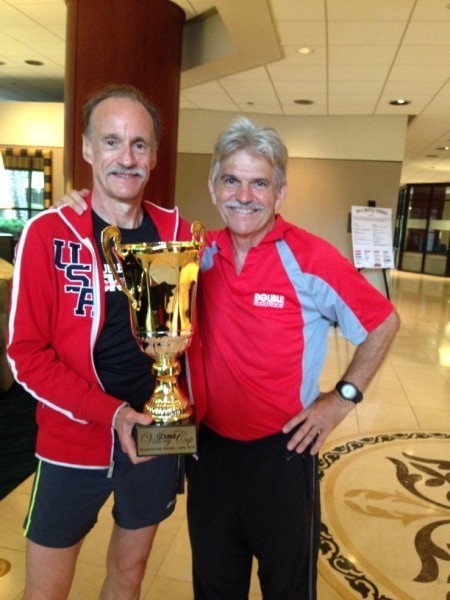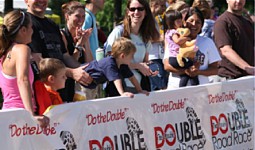UjENA FIT Club 100 Interesting Running Articles
Best Road Races and the UjENA FIT Club is publishing 100 articles about races, training, diet, shoes and coaching. If you would like to contribute to this feature, send an email to Bob Anderson at bob@ujena.com . We are looking for cutting edge material.
Click here to read all Running Articles
Posted Wednesday, February 11th, 2015
By David Prokop Pleasanton, Calif., may be a quiet, relaxed community across the bay from San Francisco, but where Double... Read Article
Posted Monday, September 15th, 2014
Peter Mullin has taken Double Racing® by storm. He broke the 60-64 age group world record in the first Double... Read Article
Posted Monday, September 22nd, 2014
by David Prokop (Editor Best Road Races) Photo: Double 15k top three Double Racing® is a new sport for... Read Article
Posted Sunday, May 11th, 2014
By David Prokop, editor Best Road Races The world’s most unusual race met the world’s most beautiful place, in the... Read Article
Champions of the Double
Monday, September 15th, 2014
A conversation with Peter Mullin
Peter Mullin has taken Double Racing® by storm. He broke the 60-64 age group world record in the first Double 15K he ever ran – the second annual Pleasanton Double last December. While he didn’t improve on that time in his next two Doubles – runners had to contend with heavy winds in Fort Lauderdale, Fla., and the course in Overland Park, Kan., had some hills – he won the prestigious Double Victory Cup for best age-graded performance in each of those races. As a result of this impressive three-for-three debut in Double Racing®, he went straight to the top of the Men’s Leader Board for the Double 15K. None of this should come as any surprise really. Before he ever ran a Double, the 5’9”, 152-pound oil exploration engineer from Houston, Tex., had established himself as one of the nation’s top Masters runners and in 2012 he was named the Ujena Fit Club Runner of the Year. The San Juan Bautista Double 15K will be his fourth Double, and this very prolific, consistent racer will be expecting a lot out of himself as he does in all aspects of his life. You see, Peter, who was born and raised in Coleraine, Northern Ireland, ran in high school, but gave up running while attending Cambridge University in England. After graduating with a degree in geology from Cambridge, he got a Masters degree at the University of South Carolina in Columbia, S.C., followed by a Ph.D. in geology from the University of Wales in Swansea, Wales, at which time he went to work in the oil business. He joined Shell Oil in ’78 and worked in oil exploration with that company for the next 25 years, living in various European countries (Spain, Holland, Norway) It wasn’t until he was in his 50s and had moved to Houston, where he was working with the Hess Corporation, one of the country’s largest independent oil companies, that he got back into competitive running. Before long he had truly entered a kind of second life as a competitive runner, one that transcended anything he’d done before. A very good 1500- and 5000-meter runner, he has now won many U.S. Masters championships, and excels at races from the 1500 to the half-marathon. He doesn’t run the marathon and it’s not just a matter of why should he, considering how good he is at the shorter distances, but a practical matter concerning his time constraints. As he explains, “The main reason why I don’t run the marathon is that I really don’t have the time to put in the mileage – I only run 30 miles a week, and I think to run the marathon well you need to be doing at least 60 miles a week.” Peter, who’s 63, is now the New Ventures Manager for Panatlantic Exploration in Houston. He and his Cuban-born wife, Sarita – they met when he was working in Spain – have one daughter, Vivian, who’s in her 20s and a Ph.D. candidate at Cambridge in metabolic and cardiovascular diseases. Photo: Peter Mullin and Bob Anderson getting ready for the second leg of the Overland Park Double 15 which was held in June 2014. How is it you first decided to run the Double? I had come across Bob Anderson’s Ujena Fit Club on the Internet and thought that would be a good place to post my race results. And when I started doing that, I learned about this new race he had created called the Double Road Race® (the Double 15K). And when I was selected as the Ujena Fit Club Runner of the Year for 2012 based on the results I had posted, it was Bob himself who called me and invited me to run one of the Double Road Races. I thought it was an interesting challenge, so I felt, ‘Let’s give it a shot!’ And that’s how I came to run the Double Road Race® in Pleasanton, Calif., in December, 2013. When I got to Pleasanton, they told me there was a fellow (Marcial Soto) who had set the 60-69 age group world record the previous year in Pleasanton and no one had even come close to breaking it during the following year. So I thought, ‘Well, there’s a challenge!’ (Editor: Peter would shatter Marcial Soto’s world record in Pleasanton by running the 10K in 37:07 and the 5K in 18:48 for an aggregate time of 55:55, surpassing the previous record of 56:37 set by Soto almost exactly a year earlier in Pleasanton when he ran the 10K in 37:38 and the 5K in 18:59.)
Photo: Peter has won two Double Victory Cups (best age-graded performance) at the Fort Launderdale and Overland Park Double 15ks. What were your thoughts about the Double 15K going into that first one? Well, I knew that this was something where you have to run a 10K, recover and then run again. As a track runner, I’m not unaccustomed to running a race in a meet and then coming back and running another race later in the day. So in that respect, this wasn’t something unfamiliar to me, although it might be to a lot of road runners. Then there’s the question of how fast you should run. Usually if you’re really fit, you can recover pretty fast, no matter how hard you run, so I just thought I’d trust my fitness. And that’s what I did there – I ran a hard 10K, and then in the 5K I did my best but found that you feel you’re running fast but you’re not, because of the energy you expended earlier in the 10K. So one of the interesting questions is – if you ran the 10K slower, would that help? In one of the upcoming Doubles, I might try that and see how that works out. But as a competitive runner, I always want to run as fast as I possibly can, which in a normal race is exactly the right tactic. But in all three Doubles I’ve now run (Pleasanton. Fort Lauderdale and Overland Park), I’ve run a hard 10K and done my best to run at least as fast a pace per mile in the 5K. Heavy winds slowed everyone down in the Fort Lauderdale Double, where you won your first Double Victory Cup for best age-graded performance. But then you came back to run much faster at Overland Park to win your second Double Victory Cup in a row.
Comments and Feedback
 Good luck Peter this weekend at the San Juan Bautista Double 15k. Going to be competitive. See you soon! Good luck Peter this weekend at the San Juan Bautista Double 15k. Going to be competitive. See you soon!Bob Anderson 9/15/14 10:00 am |
,,,,, | Overland Park is a nice course. It was a fairly tough course because it had some hills. I had a good run. Recovered well – and as I said earlier, recovery in my view is a matter of fitness. If you’re really fit, you should be able to recover pretty well. What I do for recovery, incidentally – some stretching, I do quite a bit of work on a foam roller, then after that I keep active, I make sure to drink a lot of liquids, I move around, I keep moving – the main thing is not to stiffen up. Then about 10 minutes before the 5K, I do some short easy runs and then some strides to be properly warmed up for the 5K
Photo: Peter checking his watch at the Pleasanton Double 15k in December 2013. The 2014 season started in Pleasanton. When you first ran it, was there anything about the Double that surprised you? Not remarkably so. The first time was something of a surprise. Obviously the first time you have no clue what it’s about, but once you’ve done it once, you realize there’s no problem with the recovery and your confidence is substantially higher. After that you know what it feels like, have an idea how to approach it and the question becomes what is the best strategy to use so you run your best aggregate time. (These races) are extremely well organized and for any serious runner who’s interested in a good time, it’s very important that the event be well organized. There’s no doubt (that if you run it very competitively) a Double is more challenging (than a straight race) so there’s a greater sense of satisfaction. It does give you a greater sense of achievement. It also gives you a greater amount of confidence in yourself when you come to running a straight race. What do you think is the ideal pacing in the Double 15K to run your fastest time? People might disagree, but I would say it’s probably shooting for a constant speed. I think that’s probably the best approach, if you can achieve that, rather than running a faster speed in the 5K because it’s shorter. Yes, it is shorter, but you’re also more tired or should be if you ran the 10K hard enough. Running at an even speed is the way I’ve been able to run my fastest times in regular races and I guess that would hold true in the Double. My suspicion would be that instead of running a slower 10K than you would in the first 10K of a 15K so you save something for the 5K, you should run a faster 10K because you know you have that rest break coming. Then you simply try to do your best in the 5K. You may not be able to run at a faster speed in the 5K than you did in the 10K, but then I’m not sure you’re supposed to if you pushed yourself hard enough in the 10K. That’s the longer distance and that’s where you have to bank the time, as I look at it. What is your preferred strategy in running the Double 15K is…? I think running a hard 10K is the best strategy, if you’re fit enough to do it. You can’t really make up for any time lost in the 10K when you run the 5K because it’s so much shorter. In the Doubles I’ve run, my 5K is about a minute slower than it is normally, so I need to experiment with my pace in the 10K to see if I can change that, but you’ve got to be careful how far you go in that direction if you’re a serious competitive runner. See, another thing you want to do is get some time banked in the 10K so you have an advantage over your competitors. So (my approach is) bank that time in the 10K, build a buffer against the competition. There’s a psychological aspect to this. It’s like running a 10,000 on the track, 25 laps. If you’re only a few seconds ahead of someone with a lap to go, he’ll be encouraged to chase you. If you’re far enough ahead, he probably won’t bother. So cruel as this may sound, from a competitive point of view you want to break your competitor’s heart – and that also applies in the Double. What would be your response to the idea that for the average runner the right way to look at the Double, any Double, is that it’s a race with a built-in rest break, not an event where you’re essentially running two races back to back? I think that’s very sound thinking -- and it comes down to the attitude with which you come into it. I would say that for the less competitive runner, looking at the Double as a race with a break in between is the best way to look at it. You may think, for example, ‘I don’t believe I can run 15K, but maybe I can do it this way’ (running a Double 15K with a rest built in). On the other hand, looking at a Double as two hard efforts back to back, it may seem to many people that’s overly challenging perhaps, and since a lot of these people are more interested in doing a fun run, this may not seem to fit in that category. What about the Double appeals to you the most? I like the Double because the Double Road Race Federation genuinely recognizes Masters running based on age grading. There are some other races that do that – the USATF road races and a handful of others – but most do not. One of the reasons I like running these races is because of the age-graded approach used in selecting the Grand Champions Award (the Double Victory Cup). I’m very interested in age-graded scoring, of course, because of my age. I’m been fortunate enough to win the Double Victory Cup in two of the three Doubles I’ve run – Fort Lauderdale and Overland Park. The other reason why the Double appeals to me is the challenge of doing something new and different within the race distances I’m familiar with and typically run. Running 5Ks and 10Ks all the time gets a bit tedious and it’s interesting to try something new. What is your simplest advice to someone running a Double for the first time? The Double takes some getting used to, and you should be prepared to find that the pace you run in the 5K (of the Double 15K) is slower than you think it is. By that I mean that you may think you’re running at your fastest pace in the 5K but in reality you’re running somewhat slower than you might think due to the energy you expended earlier in the 10K. In other words, don’t expect to run close to your PR in the 5K. What can you share with us regarding how it actually feels to run a Double? It’s actually remarkably similar to any other race. When you run the 10K, you try to hook yourself on to other runners to pull you along. The interesting time is when you come to the halftime and you begin to assess what you ran in the 10K compared to what your main competitors did and what you need to run in the 5K to achieve your goal in the age-graded scoring. During the halftime, I’ve even done a calculation of the comparative age-graded scores of my main competitors and me. So there’s kind of an interesting reflective period there in addition to the physical requirements of recovery. Then as you get ready to run the 5K, you still get the butterflies in your stomach as you do in a regular race. So I would say it’s like running any other race except that you have that added calculation involved. You’re obviously an elite Masters runner. Looking at it from that standpoint, what is the attraction of the Double 15K to serious Masters runners like you? Why run a race like this? I think it’s interesting. People are always looking for new challenges. One of the great things about it is you have the opportunity to set a new record, age group and otherwise, and to a lot of serious runners that’s very important and appealing. And now that Bob Anderson is adding Doubles at a variety of other distances, there’s even more opportunity to go after records. So it’s a new opportunity and a new challenge. Why should the average runner or the fun runner run a Double? I think on balance it would come down to the challenge of doing something different and fun. Plus it ties in very directly to how runners might consider organizing their training. As you know, many people target the number of miles they’re going to run in their training, but that can be very difficult depending on how many miles they plan to run per week. However, it’s easier to get the mileage in if you split the workout into two. You can get more distance in with a lot less psychological stress if you split your workout into two – say, instead of doing seven miles in a single workout for the day, you do three miles during your lunch break, then another four miles after work. It really will seem like a lot less effort. And taking something else from the Double, it’s very important to include the stretching and the other things in that period between the two runs, as you do in the Double, rather than leaving it for the end when you often don’t have time to do it? Is it true you’re thinking of going to Greece to run the Double there? I’m considering it, because (as of September 10) I’m currently third place on the Leader Board for the Double 15K, and being very competitive, I want to be at the top at the end of the year. To do that it looks like I’ll have to run the event in Greece too. So the plan would be for me to run in San Juan Bautista and then in Greece. |

Copyright 2023 UjENA Swimwear · Site Map · Feedback · Tell A Friend · Nominate a Race
Leaderboard · UjENA 5K · Double Road Race · UjENA Jam · UjENA Network









